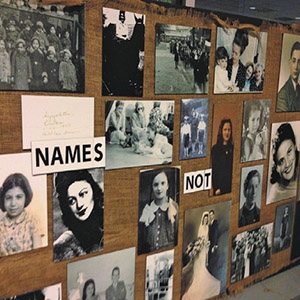



Livingston—The June 3, 2015 premiere screening at the Joseph Kushner Hebrew Academy (JKHA) of Names, Not Numbers: A Movie in the Making, presented a step-by-step account of the 8th-grade students preparing their own documentary. The project helped to assure that the last generation to have firsthand interaction with Holocaust survivors had the necessary tools to do the interviews, record them and preserve the legacy.
Rabbi Eliezer E. Rubin, Head of School, opened by mentioning that in the Torah it says, “Teach them thoroughly to your children,” and added, “The Names, Not Numbers project taught the children what their teachers and books alone cannot accomplish.”
In her introduction, JKHA Principal Debbie Finkelstein, who brought the program to Kushner explained, “The students learned interview techniques and how to film and edit, and they learned how to be faithful to Hashem during the Shoah.”
The project creator and producer, Tova Fish-Rosenberg, followed and spoke about the importance of remembering the story of the Holocaust, keeping with our Jewish identity and working to combat all forms of prejudice. Names, Not Numbers was created 11 years ago.
In its second year at JKHA, what made the program unique this time was that only at JKHA, the 12th graders mentored the 8th graders throughout the project from September to December. Thirty-five 8th-grade participants, with 10 senior advisors, interviewed and filmed survivors and edited the one hour or 90 minutes tapes to make them into 15-minute, then 7-minute stories. This chronicling of the film making, woven with the stories of the survivors, was the students’ personal connection to history. Fish-Rosenberg pointed out to laughter that the survivors in the audience for the premiere were the same age as the students—with 70 years in between.
The movie opens with the familiar chilling Yellow Star marked “Jude,” bringing a silent hush to the auditorium of over 400 intergenerational viewers.
Fish-Rosenberg remarked, “You are the witnesses,” and cautioned the students to “listen to the stories and pass them down…the survivor’s memory now becomes your memory.” She went on to tell the students, “It’s your story as much as the survivor’s story; you carry the legacy of the survivors.”
Joel Waldman from FOX News is shown teaching the students interviewing techniques. Clear examples show why they have to listen and learn to ask open-ended questions. He points out that full-sentence answers are best for storytelling. “Let the person experience their emotion,” he cautioned. For example, “Don’t say ‘don’t cry’”—rather, allow them to feel the emotion.
Saul Sudin, a professional filmmaker, chronicles the students as they are trained to make the movie, and while they conduct their edited interviews.
During the premiere, the audience sat riveted by the stories of the survivors and comments of the students as the film documented the 8th graders learning the process of interviewing and film making, as well as the history of the Holocaust.
The film, dedicated to the children who perished in the Holocaust, was filled with moving stories by eight survivors. The lone male survivor—David Mermelstein, z”l—who told his story so poignantly, passed away on May 31, 2015, days before the screening, and only months after the completion of the filming.
Composing himself after the screening, Rabbi Rubin noted that Moshe Rabbeinu said: “As Jews we have the responsibility to know our history, we need to ask to understand our past, we are the guardians of our fate—the protectors of our history.” “We now have the power,” Rabbi Rubin added. “Constructive power ensures our future and our legacy. The survivors said that we lost our names and when you lose your name you lose your power, when you have your name, you fight for it.” He continued, “Now everyone who perished has a name and we fight for them.” After remarking that he was “grateful for the survivors…for names, not numbers,” he ended the program by leading Hatikvah.
While exiting the auditorium, Serena Solomon, the mother of an 8th-grade participant, said the film was “beautiful…emotional.” Not realizing originally that the school would be providing survivors for the students to interview, she sought out a survivor for her daughter. Seeing the premiere of Names, Not Numbers, her family thought of the man they interviewed from their synagogue, where they sang songs in Yiddish at the end of the taping. They gave a copy of the film to his family. All of Solomon’s grandparents were survivors, and while none are alive, she keeps her grandmother’s clothing from the Holocaust and a tape she recorded in Yiddish. Solomon commented that her daughter Shoshana “really grew from the project.” Shoshana said that she was “amazed by the whole project, and impressed with moments in the movie that were able to catch the survivor’s emotions.” She offered that there were five girls working together in her group with 12th-grade mentors, and seven groups all together.
Sophie Lubka, a survivor from West Orange said, “I think it was great to see young people pick up the feel of what happened.” She admitted that it was a big challenge for her and a lot of kids are not interested. She added with an endearing smile, “These kids were inspiring.”
At the lavish dessert reception for the students and survivors, Finkelstein noted that three of the survivors had relatives in the school and they found the others through word of mouth.
Sudin said that the 12th graders were brought in this year and that “made it a unique challenge, which was quite fruitful.” He taught the students camera techniques and they were involved as filmmakers themselves in this process. He added that the students were his right hand and that he did the actual final film editing with their collaboration.
Fish-Rosenberg noted that over 11 years, 3000 students in various schools have interviewed 800 survivors. The four-hour films are archived at the National Library of Israel in Jerusalem, Yad Vashem and Yeshiva University’s Gottesman Library.
By Sharon Mark Cohen









